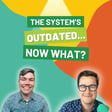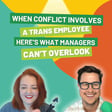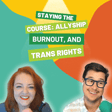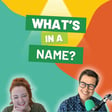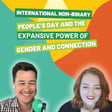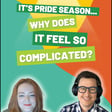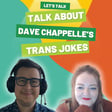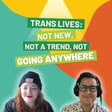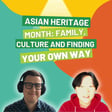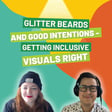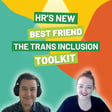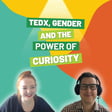Introduction to 'Gender in Focus'
00:00:04
Speaker
Hello folks, this is Gender in Focus, a podcast exploring how to create a more inclusive world for trans and non-binary people. I'm your host, Kai Scott, and I use the pronouns he and him.
00:00:15
Speaker
I'm the president of Trans Focus Consulting.
Focus on Real Stories and Expert Advice
00:00:18
Speaker
Each week I dive into real stories and expert advice, offering practical tips and actionable takeaways to help you lead with kindness, confidence, and heart.
00:00:28
Speaker
Tune in to discover how you can make a positive difference. It's just a conversation away.
Honoring Indigenous History Month with Chase Willier
00:00:40
Speaker
In today's episode, in honor of Indigenous History Month, I'm joined by Chase Willier on Squamish, Musqueam, and Tsleil-Waututh lands, in what is also known as Vancouver.
00:00:51
Speaker
Chase, welcome to the podcast. I'm so excited and grateful that you're here. Would you introduce yourself and share a little bit about your life experience? ah Thanks, from Sattelake, and
00:01:28
Speaker
and retired Mountie, actually, who worked in many First Nations community in the province. and I'm a father of a beautiful little girl and married and we live in East Vancouver.
00:01:42
Speaker
And um it's so powerful that you began speaking your own tongue. um i'm absolutely Just a little bit, but I try. that That's impressive, I will say. it takes a lot of effort to get to that stage.
Reflections on Indigenous Languages and Colonization
00:01:54
Speaker
Well, I've got some really great kin around me right now, as you know, from Treaty 6, James Makokas, my relative, Dr. Lana Whiskeyjack, and so many beautiful people and their relatives and and relations that it's hard not to be feeling the goodness and hearing all your language after spending my entire life hearing other people, their languages. Yeah.
00:02:18
Speaker
Being 60s Scoop, I was raised in the Okanagan, which is Silks territory. And when I started working with the West Bank Indian Band, which is now called the West Bank First Nation.
00:02:29
Speaker
I would have Kelowna Detachment. course, I heard Okanagan, which is, i cannot pronounce how they say their Selks language in it, Skillen, or something like that. But if I've mispronounced it, I have to apologize because that was a really bad rendition of their language. But um yeah, I've heard a lot of Okanagan being spoken through Glen and other elders since 1983 onward and other elders who are still friends of mine. Then I moved to the coast and I worked with Squamish Nation and Tsleil-Waututh in the RCMP in the 90s.
00:03:07
Speaker
So I heard a lot of Coast Salish, of Snitchin and the Homo Kamaelan languages being spoken. So I have to say that it really is incredibly meaningful. um It's so healing, it's so profound in so many ways that I can't even describe when you hear your language being spoken with people that are fluent.
00:03:34
Speaker
and you receive and all that goodness, your teachings and all the good stuff that comes with it. I don't even know if I can put words to to what that brings to my life and that disconnection through colonization in the 60s scoop. so Yeah, um I'm still learning.
00:03:53
Speaker
yeah I'm an old dog, but I'm still learning. so I think it's amazing and I'm so glad that you've taken the time. It does take time and energy and commitment to to essentially reconnect and be able to build those bridges. And like you said, you have help along the way, but it still requires you to to make
Understanding Cree Identity and Two-Spirit
00:04:12
Speaker
those steps. and and there's there's a gift in doing that by you know having that deep inner connection and resonance right totally speaking your own language it's funny because you grow you become you know you you know who you are right in such a deeper way that you just really learn to become that
00:04:38
Speaker
in our own neheal ways, our duties, our obligations, our responsibilities as a Cree person with Cree law or neheal law, right?
00:04:49
Speaker
So I probably just in the last two years had so much more depth in my life that again, i can't even articulate the meaning and the heartfelt love that that I feel for my Treaty 6 kin as well as my Treaty 8 kin, but yes.
00:05:10
Speaker
no That's amazing. And speaking of being yourself, it's, I think, really important to define a few terms, you know a few basics here.
00:05:21
Speaker
And I'm curious to hear your thoughts and reflections on very important ah term, Two-Spirit. It's not the only term. Certainly there are many other nation-specific terms, but I think it's an important kind of pan-national organizing term, and I'd love to hear your thoughts on it and you know how you define it for yourself and and for others.
00:05:46
Speaker
And it's funny, you you picked up on that really quickly in terms of other nations and their own definitions, right? But I think everybody, when they hear two-spirit, they automatically go to that term that came out of the 1990s, early 1990s, Manitoba from the gathering, where they essentially needed to find and agree upon a term so people could use as something.
00:06:13
Speaker
So they came up with two-spirit. which didn't necessarily and doesn't mean just male, female, binary, or that you have two spirits in your body. So what I like in terms of, i love Dr. Alec Wilson's definition and how Alex describes it.
00:06:34
Speaker
And basically the term two spirit represents and celebrates the rich diversity of genders and sexualities found across indigenous nations and traditions.
Responsibilities to Land and Community
00:06:44
Speaker
And it also recognizes that we're from this land, a ski, and we have a responsibility to it and to our relations.
00:06:52
Speaker
And that's what I kind of just alluded to when I said, nehi al law and roles and obligations and duties as a Cree person as well.
00:07:03
Speaker
And it all really stems back to our relationship to the land, Mother Earth, the land, a ski. And everything comes from there, right?
00:07:14
Speaker
So I like that because it really embodies those cultural teachings. And I tend to steer away from binary version and stuff.
00:07:26
Speaker
And I also know that everybody has, on Turtle Island, their own their own teachings around that. So I can only, of course, speak to ours in you know our teachings in Treaty 6, Treaty 8. Yeah.
00:07:40
Speaker
I like what you're saying in terms of it's it's sure it's an identity, but it's more than that. It's a responsibility to a group of people, to Cree society, Cree laws, to the land, to the various beings on that land.
00:07:58
Speaker
and so it's much more than just about yourself and i and that's really about indigenous people right it's not about the individual it's about the collective and again tying it very much so to the responsibilities and roles that the creator gave us and how we you know in mother earth right and how that how we relate to that and what we need to do about it and we what we and hopefully are teaching our children as we're moving forward, right? There's just so much to to consider just not being an individual.
Contrasting Western and Indigenous Views
00:08:37
Speaker
Go figure. Me, me, me, me, me. Well, and the Western sense I get is that, you know, what are the rights owed to me? And it's a very different dynamic than what am I going to contribute to others, right?
00:08:53
Speaker
And how do I fit within a much larger, you know, um ecosystem? Totally. And that's British law. Right. And the influence. And then having worked in law enforcement, I'm a little familiar with that. Right.
00:09:06
Speaker
and having studied, you know done my and Indigenous studies in you know Section 35 in the you know Constitution Act and um how that all kind of lays out on the land. and And then it's really, it's Western,
00:09:27
Speaker
ideologies, I guess, or Western ways of looking at things which has always been in conflict with Indigenous ways of knowing, right? So I think those two things are kind of slowly coming together and people are respectful enough.
00:09:41
Speaker
Right. Right. Yeah. Yeah, absolutely. I'm curious to hear a little bit more about why it's important to respect and honor nation-specific terms or, you know, there's Cree-specific terms and, you know, why those are important.
00:09:58
Speaker
Obviously, Two-Spirit is there and it's in the mix and yeah has its own place, but there's also nation-specific ones as well. Well, you have to remember if if you're you know engaging with, ah and I'll say First Nations people, right, or Indigenous people that usually you may or may not be on their territory, first of all. So if you are, then you need to acknowledge that and and kind of be respectful and mindful of not just you're on their territory, but you're kind of relating to them in that manner.
00:10:32
Speaker
you're You're a guest and hopefully a very respectful guest. So there's that context if you're off reserve or out of the territory. But I think there is that genuine respect of listening, but also trying to be respectful in terminology and have a bit of a awareness and mindfulness and of learning.
00:10:58
Speaker
and And I think that in itself, people read really quickly. um If you're not listening to indigenous people, they pick up on it really fast and they'll, um especially if you're interrupting them,
00:11:15
Speaker
um And so there's that whole thing that happens, right? And I'll just kind of say that as a police officer, you know, formerly I retired in 2010, but as a as a member, you know, you're a first responder. So you're automatically engaging in a certain way, trying to get as many details as quickly as possible sometimes on emergency situations or whatever, right?
00:11:40
Speaker
but there's that way of relating. um So by and large, I've heard a study that police officers interrupt people speaking every seven to nine seconds. oh
Cultural Sensitivity in Communication
00:11:54
Speaker
What? Oh my gosh. Yeah.
00:11:56
Speaker
That's intense. With their questions. I get it. They're trying to screen grab, right? You know, they're trying to do the five W's and try to get to the information quickly. But That becomes a habit and it is not transferable to Indigenous communities when you sit there with an elder and or other people, whether be leadership or anyone and really, and just trying to listen and learn.
00:12:21
Speaker
And that's genuine and people will know and they will pick it up really quickly. so But their terms of what Two-Spirit, some of the teachings that they have and how they do things, I'm not Coast Salish, so I would not you know even presume to know I've heard things.
00:12:42
Speaker
you know I can only share my experiences right around that. I think that's an important point as well. we're It's really important not to share questions.
00:12:52
Speaker
What you've heard from other, like somebody from a particular nation shares a teaching, it's it's not for you to carry on with that teaching. So it's keeping it to yourself. And, you know, there's a lot of intellectual property rights, essentially. I mean, that's the Western way of describing what belongs to those indigenous nations and societies, right?
00:13:13
Speaker
Totally. Yeah, it's really important to to keep that in mind. The only time that for me, because i was adopted by Glenn Douglas, who was the elder in 1983 of July at a traditional adoption ceremony on West Bank First Nation, IR number 10 at a Medicine Wheel gathering.
00:13:37
Speaker
And Glenn immediately, we the two of us just clicked and he decided that he was gonna adopt me. At the time I was lesbian and working in uniform in Kelowna detachment.
00:13:49
Speaker
And he wanted to adopt me as his daughter. So we he declared and let everybody know that we're having a and traditional adoption ceremony and we held a circle.
00:14:00
Speaker
believe there was a pipe. We had a blanketing. I remember that. He gave me his blanket. I was blanketed and he kind of made this announcement.
Traditional Adoption and Cultural Teachings
00:14:10
Speaker
And later, probably,
00:14:13
Speaker
A year and a half, maybe two years later, i was a little concerned about, I'm a lesbian. I've got to let my elders know. hey And I was a little, ah ah okay. Because I did know that Glenn did go to, he went to residential school. So I was always little, um I wonder how that's going to. Cautious.
00:14:33
Speaker
Cautious. Exactly. So I asked Leslie, ah his wife, and she just laughed. And she said, aha. I just love to see your father grow. This is going to be great. you know And he he took it in stride. Like he didn't even, not even a beat was missed. It was just seamless.
00:14:56
Speaker
And he immediately started sharing some of the teachings of the Silks people. But he did tell me one story of a woman war chief down towards south of Madison line.
00:15:09
Speaker
in Paulville Nation, which is related to silks. right And this woman, Warchief, was very fierce and kick-ass, quite revered. And was like,
00:15:23
Speaker
Yeah, and and that she had many wives as well. And I actually, I was immediately thinking, of wow, this is just awesome. How do I sign up? Yeah, exactly. How do I sign up and how do I get many wives?
00:15:36
Speaker
Unfortunately, once my elders told me what that entailed, and there was a lot of work and responsibility, I kind of thought, no, that's... Backpedaled that one. Backpedaled on that one. What do I know? I was blissfully ignorant. I think I was...
00:15:51
Speaker
you know probably 27 or 28 at the time so my learning curve was huge but yeah i have a very close relationship to the you know silks nation and other family members literally family um been a kind of adopted auntie in the 80s back when i was lesbian and um They were part of my wedding, my traditional wedding in Tofino and so and other friends and family over the years. so
00:16:26
Speaker
And that's still very much a part of my life. So I'm very grateful, absolutely grateful for them supporting and loving me so I could grow up and be ah human being, you know, human being of this earth. So there's a part of you from them.
00:16:45
Speaker
and what they gave you. Yeah. And how they brought you into their fold. To love me back to, you know, because I was at that really critical time when Glenn adopted me, I was very seriously considering quitting the police force.
00:17:01
Speaker
I was really struggling back then, and I did not know how to handle anything in a good way at all. I was only, and i was pretty young in my early 20s. Well, no, actually at that time it would have been 25, but I think that's pretty young to be saddled with the responsibilities that I had.
00:17:19
Speaker
And like I said, I was pretty immature and i but wasn't i handling things in a good way, but I am very out in Silks territory.
Transitioning and Acceptance
00:17:31
Speaker
Not a big, even when I transitioned to male after I retired from a police force in 2010, no biggie, with my relatives in the Okanagan family and other people. So I love those guys. well I can really feel that too. I just love them.
00:17:51
Speaker
Where's the Kleenex? Yeah, I know. should abroad will extra And that's so profound because I think about kind of, you know, the next part is, you know, reconnecting.
00:18:05
Speaker
And, you know one of the questions I had is just, you know, what are some of the nations or communities that you know of, Indigenous communities that are accepting of Two-Spirit relatives or their Two-Spirit relatives? I mean, Okanagan sounds like one example, and I'm sure there's others along your path. And I don't know if you just want to share some of that.
00:18:26
Speaker
Yeah. Firstly, I do need to clarify because I've known Roxanne and the family from West Bank First Nation and and Glenn and Leslie and all and Diane Lewis and the elders from OKIB and their families and whatnot.
00:18:39
Speaker
I've known Diane since I was 14. Oh wow. Yeah. Okay. Back in the day. Yeah. Back in the day, but also as a young, you know, and Roxanne, Lindley and the family since it was, as soon as I started working, I met her parents.
00:18:54
Speaker
and went around and introduced myself to the elders on the reserve in 1980, right? yeah So there's this, where they know me as ah as a person. So taking that there's colonization and all the stuff that comes, the eraser of two spirit, the the oppression and all the stuff that comes with it around colonization,
00:19:18
Speaker
I was still have those relationships. But yeah, I have received a ah lot of love and support from not just the Tsiolks people, but Squamish Nation, who you and I have been doing some work with them for, it's over three years now. Yeah, time flies, eh? Totally.
00:19:38
Speaker
And the inclusion, the amount of inclusion work that they're doing, it just it just blows me away. just... its just unbelievable actually i am totally shocked and surprised uh i think as a cop formerly yeah i tend to be a bit cynical and maybe overtly cautious fair fair because i've gotten beaten up quite a bit you know so i'm i'm tend to be like um yeah when it comes to uh
00:20:08
Speaker
engagement and I'm always like well okay when's the shoe gonna drop exactly so ah very much aware of that right but my experience with Squamish this time and not being a cop it's been just awesome Who knew? Who knew? You just had to retire. I know. And just like a feeling to love.
00:20:32
Speaker
Of course, there's still going to be people that don't understand, that don't get it, that went to residential school and have some very bad experiences that haven't healed certain parts of themselves. Absolutely.
00:20:45
Speaker
And there's still that hangover, right? This colonization that has done so much harm to our people. But that aside, the work, that Squamish Nation has undertaken to this point has been- Big shout out.
00:20:59
Speaker
Big shout out. and And i I'll be really honest, such a healing for me as well. that yeah And you were, you know i was like being overly cautious once, don't know, should we, I don't know, Kyle, stick my neck out here.
Community Inclusion and Healing
00:21:17
Speaker
Where is this going? Yeah, where is it going? and But to have made full circle again,
00:21:23
Speaker
and to have watched their blanketing ceremony for Two-Spirit, to have been part of a witness, like to ah in not as a called witness, but as a person just watching and seeing that and had just beautiful, hearing the teachings from um Sierra Baker.
00:21:43
Speaker
and other people in the nation and having such a close working relationship with the Two-Spirit Advisory Group that we've had, that we've shared so many meals together and worked with the Strategic Ops team and AM and the team of how close we've become.
00:22:03
Speaker
you know And Tyler Baker as well. As well. Phenomenal. Yeah. Real commitment and passion. and just love for for community and wanting to see everyone thrive. And, you know, there's some specific and unique things needed for Two-Spirit folks, but it's really about everyone together.
00:22:24
Speaker
Totally. And learning, i think for me, it's like I said, I'm still learning. I unlearn and learning once I left the police force. So there was a lot for me to unlearn as well.
00:22:37
Speaker
and the strong voices of her advisory group and what real engagement looks like and and that reciprocity and respect and having voice in the decision of you know, as a group, so many things.
00:22:51
Speaker
Treading gently. Totally. That really resonated for me because there's a lot of hurt. And so on, on many sides. And so how not to, you know, continue to hurt.
00:23:03
Speaker
We want to undo that legacy and how to do that in a good way, a gentle way. And, you know it it may look different than other engagements because of that right totally holding space for people to share their stories and some of them are deeply painful but they need to come out rather than sticking inside right absolutely and that's the part it's i think it's easier for me to to listen and be very present and and very much participate in that in a very different way. right So that was really beautiful.
00:23:37
Speaker
And the resources that they have and the work they have done, ah just is mind blowing. But a shout out to the IES Men Men People too, and the work that they're doing to support that and ah circles that they're doing with people. and and Yeah, it's it's really quite something.
00:23:56
Speaker
And the group that I belong to, a Two-Spirit group in Edmonton, Amoskiwasiwasiwasiagin. I'm a little slow today. Beaver Hills House, Edmonton, Treaty 6.
00:24:13
Speaker
Tapateymokumuk is the Humble Lodge, which was a four-year funded program. And that's where I met Dr. Lana Whiskeyjack and Amanda Allman from the U of A and was invited to be part of this Two Spirit Rites of Passage group where I met my relative James
Reconnecting with Family and Culture
00:24:33
Speaker
Makokas. I mean, we're both from Saddle Lake, but I didn't realize that was, of course, I was in DC all my life.
00:24:41
Speaker
not in my home territory because of the 60 scoop and I grew up here. And so, yeah, I didn't realize that James was my relative. So, and meeting his beautiful parents, Patricia and Eugene, and just being part of that, the sweat lodge that you and I both participated in many times yeah on a regular basis, but to receive those teachings, to be part of the ah Two-Spirit group,
00:25:11
Speaker
and all always learning right always learning so and incredible work that they're doing as well i just am so grateful in ways that i don't even know how to put into words really you just can't i'm it'd be something that five years and ten years down the road that I could articulate in a pretty profound way, but not right now, because i think that's how the Creator works anyways.
00:25:42
Speaker
You know, we, Creator has this incredible vision that I think if we get out of the way and stop tinkering and hanging on to our hurts and our pains and our losses, which need to be healed, sure for sure. And I've done a lot of whole lifetime of healings. So I can step aside now and not hang on to you know certain things and allow the creator to come in and work the magic and just holy crap, Batman, you know, this happened. It's like, whoa, you know?
00:26:16
Speaker
So I couldn't even write a better story and I'm, and I'm writing my memoir. So, you know, um that's the creator, right? How that works. So yeah, all these beautiful people doing incredible work, right?
00:26:32
Speaker
It's just this really strong revitalization of two spirit people. Yeah. and reconnecting and and getting woven back into communities and nations and societies and um to where, i mean, it's not always, it's not gonna be back to where it was pre-colonization.
00:26:51
Speaker
yeah It's gonna, it's still really important to reconnect with culture, language, customs in a way that allow people to heal and what you're just describing. And I think it's just,
00:27:04
Speaker
So powerful and, you know, many people don't know this is happening if they're not a part of the community, right? Right. Well, there's so many and there's teachings that I haven't received yet. yeah So there's things to learn, you know, our, and it's funny, you know, it's our language is being revitalized as well.
00:27:25
Speaker
And that kind of comes hand in hand with this learning, right? the amount of Cree words that we would have for certain things around Two-Spirit or whatever, right?
00:27:36
Speaker
um And that would be testile ah store um like the in-between people. And that it was James that,
00:27:47
Speaker
you know, I believe he went around to the elders and was spending time with them learning and receiving teachings. And he cites, uh, Vera and Jeffrey Lachance from red pheasant, I believe the elders on that one.
00:28:01
Speaker
So, yeah, I mean, there's just so much there. And I think, you know, again, colonization has done so much damage to our culture and our people, but, uh,
00:28:17
Speaker
I heard an elder say once that, you know, um and we're talking about prophecy, but 500 years of winter and then the awakening,
Prophecies and Cultural Revitalization
00:28:29
Speaker
And we are in that awakening and we have been, um one prophecy says that when the eagle landed on the moon, that those things have changed. And I don't know if that was the Hopi prophecy or not, but it was that year.
00:28:45
Speaker
Interestingly enough, I believe that it was the first native alcohol and drug treatment center in Turtle Island was that same year. So yeah. And I, you know, and it was Lee Brown that was, I was learning and hearing some of his teachings on that.
00:29:02
Speaker
And here is a ah person that's a mentor of mine and a friend for a long time. And his teacher was Two-Spirit. you know, down in Washington or Oregon, wherever he was, because he went to university down there before he moved to the Okanagan and married him.
00:29:20
Speaker
You run into these incredible people that have run into other incredible people, right? Are those elders and those mentors and teachers and people that know that that really they know their culture and they know it.
00:29:39
Speaker
because it's demonstrated and it's people, when you hear, if it doesn't come from love, it's not our culture, it's not our teachings.
00:29:50
Speaker
And I've heard that, right? I have heard that in more ways than one. And I don't know, you know, the beautiful elders that I know, that's always love, hey it's always acceptance.
00:30:06
Speaker
How they teach, You know, very patient and kind with monkeys and other people. Too patient, too kind. But, you know, ah and they demonstrate right?
00:30:19
Speaker
If it doesn't come from love, right? So they're demonstrating that cultural teaching, Cree law, right? Kindness. We don't teach by lateral violence and hitting people over the heads and and stuff like that.
00:30:34
Speaker
But yeah, so that's how... how that kind of translates and it's a good marker for me because I've always known you know with Glenn and hearing the elders in my home and over the years and stuff that yeah it's always how they teach right acceptance love the circle inclusion bringing people into the circle no one gets left behind right all those really important things so yeah It's so important what you say about elders too, they're that connection to the history of Two-Spirit people.
00:31:10
Speaker
And you know to the degree that they have that knowledge, if they've maybe not gone to residential school or kept on holding on to that knowledge despite residential school, um that is such an important source of information to reconnect with those past roles, responsibilities held by two-spirit people. you know varies from community to community, nation to nation.
00:31:38
Speaker
um And then tragically, losing elders set you know through through death and that just being that loss of connection to the past, right?
00:31:49
Speaker
Right. One thing I was wondering about with with colonization, certainly many people understand, or hopefully many, it varies, ah but understand the role of residential schools more generally, but they may not know about it specifically for Two-Spirit
Impact of Residential Schools on Two-Spirit Identities
00:32:09
Speaker
people. And if you had any um insight or thoughts on that, just to kind of paint a bit of a picture of what that was specifically for Two-Spirit folks.
00:32:20
Speaker
Yeah, well, that was part of Indian policy, you know, and that all started up prior to Canada being Canada. And then later, the Indian Act, I forget which year, but the Indian Act basically hasn't changed that much in 100 years, So...
00:32:36
Speaker
right so And, you know, i I believe it was Sir John A. Macdonald that implemented the Indian residential school system.
00:32:48
Speaker
And there was talk later on around, you know, South Africa and apartheid, looked at what we were doing up here in Canada and of implemented it in South Africa. I don't know the exact, you know, details on that. I've only heard at indigenous leaders speaking and referencing that but the idea and i've heard several things you know is to uh take the indian out of the child right destroy that yeah and and assimilate and really all that is assimilation policies acculturation assimilation
00:33:29
Speaker
And through that, figuring that if you targeted the women and children, you would disrupt that hugely. You would disrupt the culture. yeah And you would, ah because women being central and the the children, right? So taking them and putting them in a residential school, basically forcing Christianity and other religions on them, punishing them, putting them immediately as soon as they walked in the door into the binary of male and female.
00:34:03
Speaker
Oh, yeah. Girls on this side, little boys. You can't be together anymore with your brothers and sisters. You can't be in the same if they're sleeping different rooms and that whole thing.
00:34:15
Speaker
i think everyone knows the horror stories and um what happened there there's also i read um like hair you know there's this long hair among you know two spirits or or boys and that being cut off yeah it's like huge spiritual significance oh huge and just egregious you know totally yeah it's totally trauma oh my god yeah in in so many different ways of corporal punishment of washing their mouths out with soap and other things that were just downright nasty or physical abuse sexual abuse murder rape all the the nasty stuff right but um yeah the two-spirit
00:35:04
Speaker
were targeted. I mean, they were seen as little boys, perhaps some of them being effeminate, right? or Or young girls, you know, being more masculine and or and or in between right so not adhering to their real forced binary of what other people think clothing too right yeah yeah the boys wear this girls wear this and it's just it's very bifurcated yeah and separated yeah they probably didn't have blue and pink though they probably just have black uniforms or something yeah yeah Not a lot of variety. Yeah, I know.
00:35:44
Speaker
That's just so important to realize that, you know, this is not just, um you know, often people wonder, well, just reconnect. it's like, well, no, it's been severed in very deep, profound wounds, right?
00:35:57
Speaker
That take a long time intergenerationally to heal. and definitely you just recover at snap of a finger yeah because a lot i don't know what the statistics would be i really don't but i've read enough stories and i've heard enough stories and know enough people that you know they spoke their language going in there yeah right six years later they come out and and those are really important years for kids right you're if you take a six-year-old I think they there's an age where they pick up language faster before the age of seven or something, or whatever, right? so
00:36:35
Speaker
And then they're in that environment and all they're hearing is English. Of course, they're punished and beaten if they're speaking their own language. So, of course, that's not going to happen. Maybe if people don't hear them, you know, and they're sneaking around or something, like trying to be quiet. but by and large, no, several years later, they're going to pop out the other side and they're going to, and then they're going to go home and be, can't, you know, talk to their people or their family, right, or their community, or they're going to be different.
00:37:06
Speaker
And then there's this real, painful divide is this this thing that happens in this alienation and of course like some people um their families when they lose children they didn't manage it like they you know just crushed them so there was you know alcoholism and other things people trying to cope and whatever and i think some kids came home and their family wasn't
00:37:38
Speaker
the same family that they left. I had a foster brother from Sikwepen, from Adams Lake, two of them actually. And I remember them trying to go home.
00:37:50
Speaker
right ah And Donnie actually was two-spirit. My adopted brother, Donnie Oscar, he passed away several years ago and he was part of the Two-Spirit community in Vancouver for many, many years. Part of the GVNCS, the Greater Vancouver Native Cultural Society, back in the 80s early 90s.
00:38:13
Speaker
In the 90s, yeah. But yeah, when he tried to go home, it was bad. And you think somebody that's in foster care that had FASD spectrum learning problems and all sorts of stuff, and they try to go home and it's just not what I think he had hoped or dreamed.
00:38:41
Speaker
I think so many of us do, we all go home or at least we try or you know what I mean? I mean, it's like salmon spawning, right? So,
00:38:52
Speaker
And I was very, very lucky to have had not just a beautiful homecoming with my Willier family based in Sucker Creek, but also more recently my treaty six kin. So yeah, um there's that whole thing that happens and it's just so much grief, so much loss and a loss of not just two spirit, right? But everything all part and parcel of it, right?
00:39:18
Speaker
For sure. Yeah, absolutely. And it makes sense why it takes so long and may not go exactly how you imagined, right? Especially that homecoming. i totally understand why people want that warm embrace after, you know, being out in the cold, essentially.
00:39:35
Speaker
Yeah. You know, figuratively and emotionally, spiritually, and then that not quite happening. Or in your case, it did. it just varies, right? Yeah. Yeah.
00:39:46
Speaker
And there's people that are actually denying the Indian residential school app, which is kind of comical, actually. um that But when interestingly enough, yeah oh I was doing some counseling training.
00:40:01
Speaker
as a contractor on ah you know a sensitive work and we were allowed to go see a
Reconnecting Post-Residential Schools
00:40:08
Speaker
counselor. So I went to see an indigenous gym counselor and Laura had asked, ah oh it's your family. um Anybody go to residential school and I was like, oh well, I'm pretty sure they did. I think my dad did and probably and maybe my aunties, right? I don't know, but I can ask, right?
00:40:26
Speaker
So she said, well, if you, you know, we'll put it in an application for your, we'll get your counseling covered for, from, you know, First Nations Health, right? So was, okay, I'll go ask. Right.
00:40:38
Speaker
So, yeah, my father, my auntie Sally Badger, my auntie Georgina Willier, my auntie Vi, who's passed, and my three uncles.
00:40:51
Speaker
Yeah. It's just staggering. Yeah. And that's when my brother counts. And we're only a year difference, right? So, yeah, they're...
00:41:04
Speaker
significant Significant. yeah It shocked the hell out of me actually. I was like i always... You saw like one or two kind of thing? or Yeah. I actually, and it's funny growing up at 60 Scoop, you know, there's that kind of disconnect in your learning, your culture You're learning your family's history and all this kind of stuff. So you're like, yeah, that residential school there. Just, you know, when I was in my 20s and 30s, I thought, it has nothing to do with me. i don't know anybody that went, you know, right, except for Glenn.
00:41:35
Speaker
Yeah. Right. So I knew Glenn did and other people on the res that I worked yeah with and the band members and stuff. But personally, no, it's funny that we do that, a that keeping that at arm's length. Sure. Oh, that's nothing to do with me. yeah wow That's protection.
00:41:54
Speaker
I think so. I really do. um And denial and so many things that we do to survive or to not feel pain or to kind of... So that was part of my growth journey or my you know that journey of... of kind of reconnecting and learning, right?
00:42:13
Speaker
But yes, very much so. My mother never went because she was raised by her grandparents. They hit her in the bush. And there are people that did that, right? so but And it's interesting because my mother's very fluent. She's a very well-known elder, ah culturally, everything, right?
00:42:33
Speaker
And again, works the teachings around. but She had told me once in one of the universities in Alberta that somebody had come to her and they were this whole shaming thing that goes on in ceremony and sweat lodge. And an elder had said this and this and that.
00:42:52
Speaker
And my mother said, well, I went to that person and corrected that. And that's the same thing, you know, it has to come from love. There's that fundamental, you can tell, you know, certain elders that know their teachings. And ones that are too, that colonization is kind of really impacted and they picked up a few things as well. Not saying that we do have teachings, we do.
00:43:19
Speaker
Fortunately, she did speak to this person and and corrected certain things. So, yeah. So there is work going on with Two-Spirit in different places and spaces all over.
Natural Diversity and Respect for Earth
00:43:33
Speaker
Young people that are really learning as Two-Spirit that are really, know, it's interesting to see whether it be in in in our Two-Spirit group in Edmonton or in Treaty 6 or Squamish when you're at gatherings. You look at the blanketing, eh?
00:43:53
Speaker
And they're all out there. And it's like, holy you smokes, where did all these people come from? which And they're starving for that culture. They really want it. And they're they're ready to show up. Totally. Sometimes it's complicated, right, with certain cultural spaces for them to to come as they are.
00:44:11
Speaker
Yeah, and and then just the the teachings and the diversity of the teachings, right, around that. And and I think Sierra was speaking to that very eloquently and knowledgeable. But if you go figure that we come from Mother Earth and you look at the diversity in life forms, not just in the sea, but other other places, do you think? Uh-huh.
00:44:40
Speaker
Let's connect some dots here. Yes, please. And plants. And we are, i mean, i think some people think they're just because we're human beings, we're supposedly at the top of the food chain or something. Well, no, we're just human beings.
00:44:56
Speaker
We're humble, you know, and we're just, you know, part of the world around us. And as such, we have diversity in sexuality and our gender.
00:45:09
Speaker
Period. Go figure. Because we're a life form on Mother Earth. Can you imagine that? I know. i'm shocked. Absolutely shocking. Oh, man. Newsflash. I know. There was died diversity. Can you imagine? That's so beautiful, though, and so important to continuously recognize in ourselves, in the world around us,
00:45:32
Speaker
Yeah, that we're not apart from, we're within. And we are that beautifully expressed diversity. um We have to be. yeah Our life and our ah humanity depends on that.
00:45:47
Speaker
And all we have to do is look at what's going on in the world and climate change and everything else. yeah It's our relationships and our our relationship relationships. you know, as humans to one another, but also to Mother Earth and everything else.
00:46:01
Speaker
And it is really about that. And we rely on them ah for life. Let's just be very clear about that.
00:46:14
Speaker
They don't need us, but they have teachings when the Mother Earth was made and in the beginning, and the animals know that, and the plants that we were coming, and and those teachings that they were to help us, right?
00:46:31
Speaker
But they don't need us. I think it's really important around relationships. You know, we know who we are. we know as two-spirit people, as human beings as well of this earth.
00:46:46
Speaker
And there's so much to learn and to do, but how we move through the world is in a respectful way, right? Period. And with humility too, and and gratitude. That's the thing i get in you know some of these teachings about you know animals sacrificing themselves.
00:47:02
Speaker
like That just is very touching to me. To your point, we depend on them. And so thank for me to express that gratitude and being respectful and and not you know kind of...
00:47:14
Speaker
you know, tossing them aside or, you know, thinking that they're in the way or or annoying or need to be, you know, powered over in some way. It's just like, how do I posture towards other beings, right?
00:47:26
Speaker
Right. And that awareness, not mindful in the respect, right? You hear stories about most twos or pasqua, most twos, buffalo or bison, and them and relating to humans and knowing and having that, you know, how many stories of our people have around that, right?
00:47:48
Speaker
um But yeah, so that is so important. And I think that's where it really is as human beings, as a two spirit person,
00:48:01
Speaker
You know, I look at my responsibilities as a father, as a, as a maid or a partner, a husband, as a family member, as a community member to SLGBTQIA plus, is and my responsibilities to my, my kin and treaty six and my two spirit
Responsibilities of Two-Spirit People
00:48:22
Speaker
yeah Right. My relations there, I'm uncle. I have responsibilities to people and to that, to the lodge or, to the group, right, as well as I have other responsibilities to my other, you know, treaty eight kin and my family or, you know, my aunties and other ah things that are going on in my life, yeah right?
00:48:47
Speaker
Ceremony and my relations in the Okinawan nation as well, my adopted relations. And so there's all those things to consider, but Who I am is part of that two-spirit, right?
00:49:04
Speaker
Oh, yeah. A two-spirit person. And that includes all, you know, all those things. At first and foremost, you know, being indigenous and knowing those things, right?
00:49:16
Speaker
Yeah. Speaking of responsibility, think more and more people want to step up and be supporters of Two-Spirit people, right?
00:49:27
Speaker
They're just getting to know who Two-Spirit people are. You know, they're trying to understand what the unique challenges are, and we've talked about some of those. There's many more.
00:49:38
Speaker
And so i'm I'm curious if you have any kind of thoughts about how people can show up for Two-Spirit people. Well, I think right now we're in a time where being trans or two-spirited or non-binary, it's a pretty scary, frightening time.
00:49:55
Speaker
That's where allies need to step up. They need to speak out. They need to support because we may not be in a position to. um it's It's actually, people are getting death threats and all this kind of negative stuff and a lot of hate in the world.
00:50:15
Speaker
and all a lot of things are happening, but allies can influence. Your voice is needed to, no, that's not right.
00:50:26
Speaker
ye Or I believe, you know, I believe in love. I believe spirit. I believe in spirituality. And that is love, period.
00:50:37
Speaker
Right? um And there's just to support And if you you know are not in able to do that, some people will do it online. You can support Indigenous Two-Spirit groups and donate because they're always looking for you know funding, right? yeah Always to support them so what they can do stuff, cultural activities or hold circles and do things together. I mean, there's just so so much.
00:51:12
Speaker
now more than ever is the allies really need to step up. Absolutely. That's such a good point. And, you know, sometimes people hesitate and are like, well I don't know everything. And so don't know if it's my place or, you know, a whole number of things. I've certainly done that on other topics, right? The long list of it's not me, but at the end of the day, if something is going off the rails, you know, something somebody says or,
00:51:40
Speaker
you know, denying residential schools or is two spirit really a thing, right? Like, yeah, that's when there's that moment of like, you know what, i heard this podcast or I read this article or, and I know this to be the case. yeah And to provide information, especially in mis and disinformation is just so critical and you don't need to have it all figured out just enough to say, Hey, I don't think um that's the full picture here. Yeah. Here's some of what I know. Let's figure out some more together.
00:52:09
Speaker
you know Yeah. And around that too is Two Spirit have been here since time immemorial. Absolutely. Period. Yeah. um just as other creatures on Mother Earth have lived, blades of grass, birds, four-legged ones, and trees, or anything else, that what grows and lives in the ocean or in the sky and in the earth, just as much.
00:52:35
Speaker
And it's okay to just stand there and stand up and just say, I'm so-and-so. I don't know very much or nothing at all about Two-Spirit people, but but I'm here to stand with you.
00:52:49
Speaker
Period. yeah Right? That's it. Stand up. and You know, there's an old ceremony you used to have or, you know, standing up your relatives. I believe that we're all related.
00:53:03
Speaker
You know, the human family is related. We are in all four directions of the world.
Unity and Identity Respect
00:53:11
Speaker
um We are the human family.
00:53:13
Speaker
So the honor of one is the honor of all. Right. But we need to remember that, you know, so we need to stand up our relatives and we may not know your name.
00:53:27
Speaker
But if you were to stand up and just say, hey, I'm here with you or I support you. I don't know very much, but I'm here. That's all it takes. so simple.
00:53:39
Speaker
It is very simple. And be a relative. Stand up with us. um Because we are the human family. And the only one that can change that is the creator.
00:53:52
Speaker
So i don't kind of tend to mess with any of the other stuff. I just believe in our teachings. as a First Nations person, as a Nehia'o person.
00:54:04
Speaker
That's so beautiful. And few other things that we've heard along the way that just want to clarify a few things. In particular, sometimes people know that somebody is Indigenous and then know that they're trans and then kind of put the two together and then apply the term two-spirit to that person. yeah And I wondered if you have any thoughts or feedback on that.
00:54:28
Speaker
Well, think it's probably, well, no, no. First of all, no, no. um And it's up to that person to identify themselves.
00:54:38
Speaker
And they may or not. yeah They may choose not to. As diverse as Turtle Island is, there is no cookie cutter thing. i mean, that's that's so key. I think sometimes people in their keenness to support might have a few pieces and then want to like finish the rest of the story.
00:54:56
Speaker
For yeah. Yeah, for somebody. For somebody. But that's not appropriate. Yes. And there's a lot of people that, I think in the 90s when that two-spirit gathering happened in Manitoba, and that was one, there's probably others, but that was used. And then people started using that term. Mm-hmm.
00:55:17
Speaker
And ah ah even when I was in the lesbian community in Vancouver in the 90s and I'd heard it and people were using it, and I wasn't comfortable with it, to be honest. I did not use it just um back in the 90s. And that wasn't really until in the 2000s something, right?
00:55:33
Speaker
but Because I understood that there was our own languages and terms, right? I knew. and Having been around Glenn, listening to him speak Okanagan so much and in the home and just hearing other people speak. And there would be, of course there would be, our own language and terms for that.
00:55:58
Speaker
And our own roles and what they did. And that would change from nation to nation. There is, i think we had... very interesting roles. Marriage counselors please because we could relate on both sides or part of the Sundance poll, the ceremonies or peacemakers or i mean the roles were healers or some people say shamans i don't really necessarily like that term right but um you can hear a number of different roles helping and some of the work that they were doing to help their community in that collective functioning carrying knowledge and ah very much respected in the communities because they have that unique perspective the people knew that so
00:56:51
Speaker
And it would make sense. That was just something that was there. Makes sense. And good to to respect it in terms of the language that's used. right And you know people have come to that understanding on their own, through their own journey, similar to what you're describing.
00:57:09
Speaker
right And so we want to respect that journey and listen very carefully to the words that people use for themselves. And then... echo that back you know like if you need to at all right yeah so that's and so powerful because that language is something that had people largely had to probably unearth and you know from elders or connection with community so it's it a hard thought exactly and action with And that's where, you know, when James was going around visiting people, and he cites Vera and Geoffrey Lachance, right, in Red Pheasant.
00:57:45
Speaker
And kind of like academics would cite in their papers, you know, kind of like that. You get this pan-Indianism thing that happens in urban places and spaces and the cities and stuff. There's this kind of thing that, you know,
00:58:04
Speaker
comes together but i I've always been a little more cautious around that. I may not have known my Crete teachings back then but I knew enough just being around Okanagan people.
00:58:17
Speaker
It sounds like they're they're waiting for you. Yeah. Totally. One other common question we get is can non-Indigenous people use the term Two-Spirit for themselves?
00:58:31
Speaker
Oh absolutely not. It's very important clarification. i was actually Say it again for the people at the back. Please, no cultural appropriation.
Cultural Significance of Two-Spirit Term
00:58:40
Speaker
You know, we can laugh about it, but pretend Indians um thing is just so widespread.
00:58:48
Speaker
The moment I got around ceremony, they're just like, oh my, it's just popping out everywhere. Yikes, out of all the bushes. Yeah, yeah. it's yeah It's really important because think many people just, there's ah it's a very powerful word, right?
00:59:04
Speaker
yeah And so they feel drawn to it. yes and But that doesn't mean that you can use it. And I've had to have a few conversations with non-indigenous folks who are inclined to do so. They're like, it's so beautiful. and i'm like, yeah, I agree.
00:59:17
Speaker
and it's not for us yeah as a non-indigenous person and um and it it shows up in in surveys too right where we've had to very carefully craft the questions and this is coming from you know Two-Spirit Dry Lab there's like great directions on how to set it up so that non-indigenous people can't select this and I think you know it's coming um you know, don't, can't speak to everybody, but I think a lot of it is ignorance.
00:59:44
Speaker
And so that's why it's important to talk about it so that people realize, okay, yeah, I see why we can't. You know, it's not just that it's cultural appropriation. It's that, you know, two-spirit, two-spirit has this history of, you know, um harm and, you know, through colonization. And there's this hard one, hard fought connection to this word. And,
01:00:07
Speaker
You know, somebody can't just waltz in and pick it up, right? Like, it's just, that's insulting. it Yeah, it is not just offensive, it's insulting. And you wanna, you know,
01:00:19
Speaker
Just, yeah, there might be a few people, if you were on the res, that just, you know, but they might not take too kindly to you. us yeah Just beware. Well, that's the thing. Just, you know, have that awareness. And shirt certainly education is is helpful in that. but you know Just think before kind of acting, and that's certainly something that I've time and time learned.
01:00:45
Speaker
um But it is about listening, being responsive, being aware. um you know If somebody tells you not to do something, steer clear of it. Totally. At the end of the day, pretty simple.
01:00:56
Speaker
Yeah. And when and when and that's exactly it, because I've I've ran into that before. I've tried to explain that to people and they're not listening. First of all, they don't want to listen. Right.
01:01:09
Speaker
and And then you're like, OK, we're you're you're not getting it. You know, you're not getting But it really is about respect.
01:01:20
Speaker
And if you're not going to listen to what I have to say as a First Nations person, and that really is pretty telling. Right there, non-starter.
01:01:31
Speaker
Yeah. And I would just, I would have to remove myself, you know. Yeah. So. Healthy boundaries. Yep. Absolutely. Yeah.
01:01:42
Speaker
Totally understand that. Now, I'm curious, kind of getting to the end of of this amazing episode, and just so thankful and grateful.
01:01:55
Speaker
um i always kind of want to have a sense of what's your vision and hope for Two-Spirit? So looking into the future, you what is what does the future look like?
01:02:06
Speaker
The well, obviously there will be more Two-Spirit people coming up up and coming that we'll be able to share teachings and carrying on um cultural teachings whether it be in two-spirit lodges or from the elders and carried through the generations where that knowledge is transferred where it's a vibrant robust community where people grow up to be healthy
01:02:41
Speaker
You know, there's so much, again, through colonization. But for me, 60s scoop, a lot of grief. So much stuff to heal. yeah Please don't take as long as I have because I'm older now. I'm i'm an old person.
01:02:58
Speaker
the The road is winding sometimes. Yes, yes. but Try not to do the turtle thing, you know. It's... Or, you know, slow to get it, but that healing journey of coming into yourself that and loving yourself and being, you know, who you are and being just, yeah, this is me kind of thing, right?
01:03:23
Speaker
ah And being able to share that goodness with others, but walk in a good way too, right? Yeah. that's so wonderful and beautifully put. This gives me a lot of hope.
01:03:38
Speaker
And certainly that's something we need right now. And in particular, Two-Spirit folks, like to to be surrounded with love and respect and supported and and brought not just to surviving, but thriving, right?
01:03:53
Speaker
Go seek your elders. Go seek your communities if you can or go to circles, whether be in the city or in your communities. And you know who the healthy people are.
01:04:04
Speaker
You know who the elders are that speak with love and kindness and respect. But, you know, we know. it You don't... Everybody knows because they have a...
01:04:16
Speaker
not just a spirit and an aura, but a vibration. right So there are you know not you can tell who they are and that you're in a safe And there are safe places.
01:04:31
Speaker
Sometimes in our own isolated communities, it's only online. It's sad to say, but there are groups and there are circles for Two-Spirit people online.
01:04:42
Speaker
and activities and things, right? So things are happening in Turtle Island, Two Spirit Sundances and Two Spirit Lodges happening and all sorts of stuff. So it is going on.
01:04:58
Speaker
Yeah, absolutely. And it is a very exciting and it's important message to to be connected in any way possible. right Absolutely. It look different for different people. And certainly also as ah as an ally of of Two-Spirit folks, i we are providing a resource for folks.
01:05:16
Speaker
ah We've got here that we'll link in the show notes, but essentially, you know no matter who you are, as Chase mentioned, you can support and it is really important and imperative that we we show up for one another.
01:05:29
Speaker
ah So we've got this lovely resource, check it out, read it, you know do some things. It's not just about being, it's about action as well. so And it doesn't have to be really complicated either. um And really important to understand the issues and and to take action.
01:05:46
Speaker
So that's my my invitation to all your allies out there. And again, thank you so much, Chase. This has been such a wonderful time and I've really enjoyed it. Obviously, you know, we have a deep friendship that I am just forever grateful for. And and I'm so grateful that you're in my life and I appreciate your time here today.
01:06:07
Speaker
Thanks, Cod. You're making me weep. Oh, no. Tears at the end. Absolutely. End note. And we'll say goodbye from here. So thank you again.
01:06:19
Speaker
You bet. Bye-bye.

